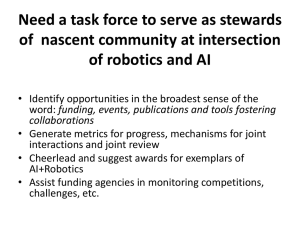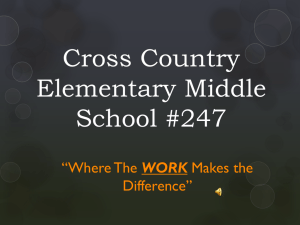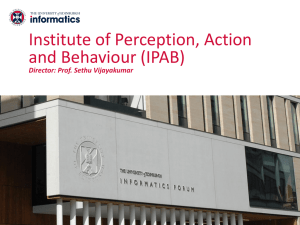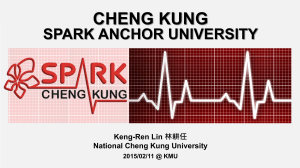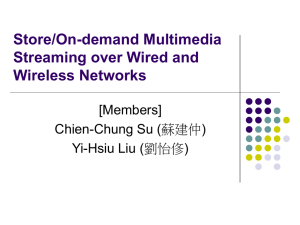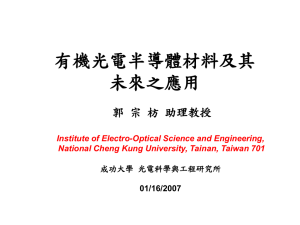slides - Human Sensing Laboratory
advertisement
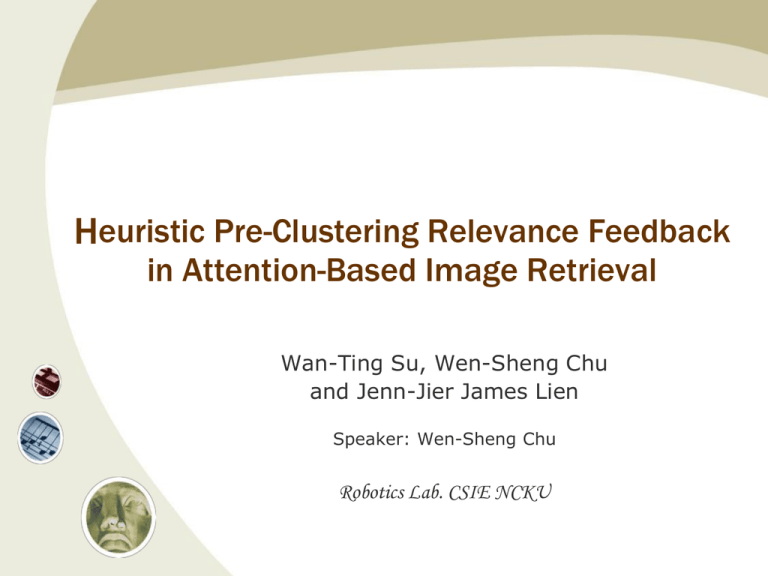
Heuristic Pre-Clustering Relevance Feedback in Attention-Based Image Retrieval Wan-Ting Su, Wen-Sheng Chu and Jenn-Jier James Lien Speaker: Wen-Sheng Chu Robotics Lab. CSIE NCKU System Interface Query Image Positive Feedback Negative Feedback Heuristic Pre-Clustering View User can change the positive group number on his/her own User can revise the clustering results manually Result View Robotics Lab, CSIE NCKU System Overview Offline Module : Attention-Based Image Retrieval Low-Low Subband Wavelet Transformation Image Database Query Image No END User Feedback? Attended View Extraction Feature Extraction from Attended View Best Matches Ranking by Euclidean Distance Yes Ranking by GBDA Learning PCA Heuristic Pre-clustering VQ User Re-clustering Online Module : Heuristic Pre-Clustering Relevance Feedback Robotics Lab, CSIE NCKU Wavelet and Attended View Extraction • To reduce the computational cost • Contrast extraction is applied to the wavelet coefficient in the LL-subband. attention center Gaussian distance Ci , j d ( pi , j , q) q contrast value of pixel p at image location (i, j) Got saliency map! neighborhood of pixel (i, j) 1 x 0 CM y0 1 CM N 1 M 1 C j 0 i 0 M 1 N 1 C i 0 j 0 M 1 N 1 C i 0 j 0 Robotics Lab, CSIE NCKU i, j i, j i i, j j System Overview Offline Module : Attention-Based Image Retrieval Low-Low Subband Wavelet Transformation Image Database Query Image No END User Feedback? Attended View Extraction Feature Extraction from Attended View Best Matches Ranking by Euclidean Distance Yes Ranking by GBDA Learning PCA Heuristic Pre-clustering VQ User Re-clustering Online Module : Heuristic Pre-Clustering Relevance Feedback Robotics Lab, CSIE NCKU Visual Features Extraction • Table1. 32 low-level visual features Features Dimension Color mean, standard deviation and skew in HSV space 9 Standard deviation of the wavelet coefficients in 10 pyramid de-correlated sub-bands 10 13 statistical elements extracted from the edge map such as max fill time, max fork count, etc. 13 Robotics Lab, CSIE NCKU System Overview Offline Module : Attention-Based Image Retrieval Low-Low Subband Wavelet Transformation Image Database Attended View Extraction Feature Extraction from Attended View Got features! Query Image No END User Feedback? Best Matches Yes Ranking by GBDA Learning PCA Heuristic Pre-clustering VQ Ranking by Euclidean Distance User Re-clustering Online Module : Heuristic Pre-Clustering Relevance Feedback Robotics Lab, CSIE NCKU Pre-Clustering • Principal Component Analysis (PCA) + • Vector Quantization algorithm (VQ) Robotics Lab, CSIE NCKU User Re-clustering User Re-clustering System Pre-clustering Result Robotics Lab, CSIE NCKU User Re-clustering Result System Overview Offline Module : Attention-Based Image Retrieval Low-Low Subband Wavelet Transformation Image Database Query Image No END User Feedback? Attended View Extraction Feature Extraction from Attended View Best Matches Ranking by Euclidean Distance Yes Ranking by GBDA Learning PCA Heuristic Pre-clustering VQ User Re-clustering Online Module : Heuristic Pre-Clustering Relevance Feedback Robotics Lab, CSIE NCKU Re-weighting Scheme • Group-Based Discriminant Analysis (GBDA) • Multiple positive and multiple negative classes • Clustering each positive class • Scattering the negative example away from each positive class Negative Samples Bouquets of Flowers Single Flower Positive Samples Robotics Lab, CSIE NCKU GBDA W T S PNW W arg max T W SW W W Sw : the sum of the within-class scatter matrix of the positive groups c S w Si i 1 Si xC (x mi )(x mi )T i mi : the mean of the ith positive class Ci c: the number of positive groups SPN is the sum of between-class scatter matrices of positive-to-negative c S PN S Ni i 1 S Ni yD (y mi )(y mi )T D : a set of negative examples Robotics Lab, CSIE NCKU Experiment Result (1) • COREL image database • QS2: 1000 images from 10 selected categories • Each of 10 categories contains 100 images and is used as queries. Table 1. Image Categories in Query Set 2 1. Sunset 2. Flower 3. Car 4. Ape 5. Mountain 6. Penguin 7. Tiger 8. Bird 9. Horse 10. Building precision relevantimages retrievedin topN returns N Robotics Lab, CSIE NCKU Experiment Result 60.00% (2) Attention-Based System Global 55.00% Precision 50.00% 45.00% 40.00% 35.00% 30.00% 25.00% 20.00% 10 20 30 40 50 60 Scope Robotics Lab, CSIE NCKU 70 80 90 100 Experiment Result 80.00% (3) Attention-Based System Global 70.00% Precision 60.00% 50.00% 40.00% 30.00% 20.00% 10.00% 0.00% 1 2 3 4 5 6 Category ID Robotics Lab, CSIE NCKU 7 8 9 10 Experimental Results Query Image First-time retrieval results Precision = 5/10 Precision = 7/20 Robotics Lab, CSIE NCKU (4) Experimental Results First-time feedback results Precision = 8/10 Precision = 17/20 Robotics Lab, CSIE NCKU (5) Experimental Results Second-time feedback results Precision = 10/10 Precision = 20/20 Robotics Lab, CSIE NCKU (6) Conclusion • The major work in this study is integrating attention-based image retrieval with the relevance feedback algorithm using multiple positive and negative groups. • The system guides the user in clustering positive feedbacks by providing heuristic pre-clustering results. Then the user can revise the clusters manually. Robotics Lab, CSIE NCKU Experiment Result - Video Demo Robotics Lab, CSIE NCKU
